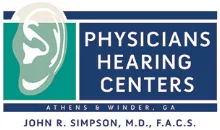Tinnitus is a very common condition, affecting almost 10% of the US adult population alone.1 In fact, hearing loss and tinnitus are also the leading service-related disabilities among US veterans.2 But what is tinnitus exactly? Let the hearing specialists at Physicians Hearing Centers tell you everything you need to know.
What is Tinnitus?
Tinnitus is the medical term used to describe the perception of a persistent sound when there is no external sound actually present. Have you ever experienced a sudden high-pitched ringing that no one else seems to hear? That’s tinnitus.
What does tinnitus sound like?
Tinnitus stereotypically sounds like a persistent ringing in the ear. However, tinnitus can manifest in other ways too including buzzing, hissing, swooshing, and clicking. And it doesn’t have to affect both ears; you may experience tinnitus in one ear or the other or both.
Tinnitus itself can also be chronic (permanent) or intermittent (on and off). For some, tinnitus symptoms can be mild and infrequent. For others, tinnitus symptoms are constant, severe, and debilitating. But for everyone suffering from tinnitus, relief from symptoms can drastically improve the quality of life.
What causes tinnitus?
Unfortunately, tinnitus isn’t caused by one standalone thing. There are quite a few factors that can trigger tinnitus including medication, age, and physical trauma.
- Age: As we age, the sensitive sensory hairs in our cochlea called cilia start to deteriorate leading to the development of age-related hearing loss (presbycusis).
- Loud noises: Exposure to loud noises over an extended period of time can also cause serious damage to your cilia resulting in noise-induced hearing loss (NIHL).
- Obstructions: Earwax, congestion and debris blocking the middle ear can cause pressure to build up in the inner ear, affecting the operation of the eardrum. Obstructions directly touching the eardrum can also irritate the organ.
- Injuries: Head, neck, jaw and brain trauma can cause nerve, blood flow and muscle issues, affecting the middle or inner ear.
- Acute barotrauma: Extreme or rapid changes in air or water pressure can damage the middle or inner ear.
- Ototoxic medications: Some prescription medications such as antibiotics, anti-inflammatories and antidepressants are harmful to the inner ear as well as the nerve fibers connecting the cochlea to the brain.
- Other diseases and medical conditions: Disorders like otosclerosis and Meniere’s disease are known to cause tinnitus. Tinnitus can also be a symptom of health conditions like cardiovascular disease, hypertension, stress and anemia.
Tinnitus and hearing loss
Did you know that many who experience tinnitus usually have hearing loss as well? In a 2023 study, researchers found that tinnitus occurred as a comorbidity with sensorineural hearing loss (SNHL): the most common form of hearing loss.3 And while SNHL is both progressive and irreversible, proper treatment can help relieve symptoms successfully.
Is There a Cure for Tinnitus?
As of right now, tinnitus has no known cure. But researchers continue to investigate, and new studies on the subject are published every year. And thankfully, with today’s technology, people with tinnitus don’t have to simply “learn to live with tinnitus”. There are treatment options.
How do you treat tinnitus then?
Again, there is no cure currently for tinnitus. However, there are tools and interventions available to help relieve symptoms with exceptional results.
- Therapy: Sound therapy, behavior and/or cognitive therapy, and tinnitus retaining therapy can help patients control their perception of tinnitus symptoms and how they react to them.
- Treating comorbid conditions: By resolving any underlying medical conditions, middle ear obstructions, or head, neck, jaw and brain injuries, patients with temporary tinnitus may be able to cure or lessen their symptoms.
Do hearing aids help tinnitus?
Yes! Certain tinnitus-specific hearing aids can help relieve tinnitus symptoms, especially if those symptoms are caused by hearing loss. Our newest generation of prescription hearing aids offer customizable programming capabilities to mask the exact frequencies at which you experience tinnitus symptoms. How cool is that!?
Can tinnitus go away?
Tinnitus can be temporary, especially following acoustic trauma or exposure to very loud noises. But for the most part, tinnitus is persistent.
If You Have Tinnitus, Find Relief Today at Physicians Hearing Centers
The first step to tinnitus relief is proper diagnosis. If you experience tinnitus symptoms lasting more than 3 months, you may have chronic tinnitus. In that case, you should seek a licensed hearing specialist to discuss your hearing health.
At Physicians Hearing Centers, our team of dedicated hearing specialists are ready to help get you back on the path to better hearing and better living. Take your first step with us today.
If you’re ready to take your hearing health seriously, schedule an appointment today.
Not quite sure if you have tinnitus? We offer a FREE online tinnitus test that you can take in the comfort of your own home.
- American Tinnitus Association. Why Are My Ears Ringing? https://www.ata.org/about-tinnitus/why-are-my-ears-ringing/
- US Department of Veteran Affairs: Office of Research and Development. VA Research on Hearing Loss. https://www.research.va.gov/topics/hearing.cfm
- Vasilkov, V., Caswell-Midwinter, B., Zhao, Y. et al. Evidence of cochlear neural degeneration in normal-hearing subjects with tinnitus. Sci Rep 13, 19870 (2023). https://doi.org/10.1038/s41598-023-46741-5
